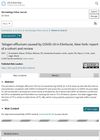Neurological Post-Acute Sequelae of SARS-CoV-2 Infection
September 2022
in “
Psychiatry and Clinical Neurosciences
”

TLDR Long COVID affects over half of COVID-19 survivors, causing a range of symptoms like fatigue and neurological issues, with no specific treatment yet.
The document discusses the neurological post-acute sequelae of SARS-CoV-2 infection (PASC), also known as long COVID. Symptoms can range from 3.5% to 84% of patients and can persist even after recovery from the acute phase of COVID-19. A study found that 57% of 273,618 COVID-19 survivors experienced one or more symptoms within 6 months after infection. A meta-analysis of 151 studies with 1,285,407 participants found that at least one PASC symptom occurred in 50.1% of patients up to 12 months after infection. The most common symptoms were abnormalities on lung CT and abnormal pulmonary function tests, followed by generalized symptoms such as fatigue, pain, and fever. Psychiatric symptoms had an estimated prevalence of 25.7%, while neurological symptoms occurred at a rate of 18.7%. The study also found that 199 out of 359 patients seen at an outpatient clinic had PASC, with the most common complaints being olfactory and taste disorders, fatigue, memory impairment, headache, hair loss, and sleep disorders. The prognosis of PASC is still unclear, and there is currently no specific treatment for PASC symptoms. Risk factors for PASC include severe COVID-19, female sex, and underlying anxiety disorders. The pathomechanism of PASC is not yet clear, but chronic inflammation may be a factor. The document emphasizes the importance of careful evaluation of patients who complain of these symptoms using multidisciplinary approaches. The document concludes by emphasizing the need for further research to understand the pathogenesis of PASC and develop effective treatment strategies.











